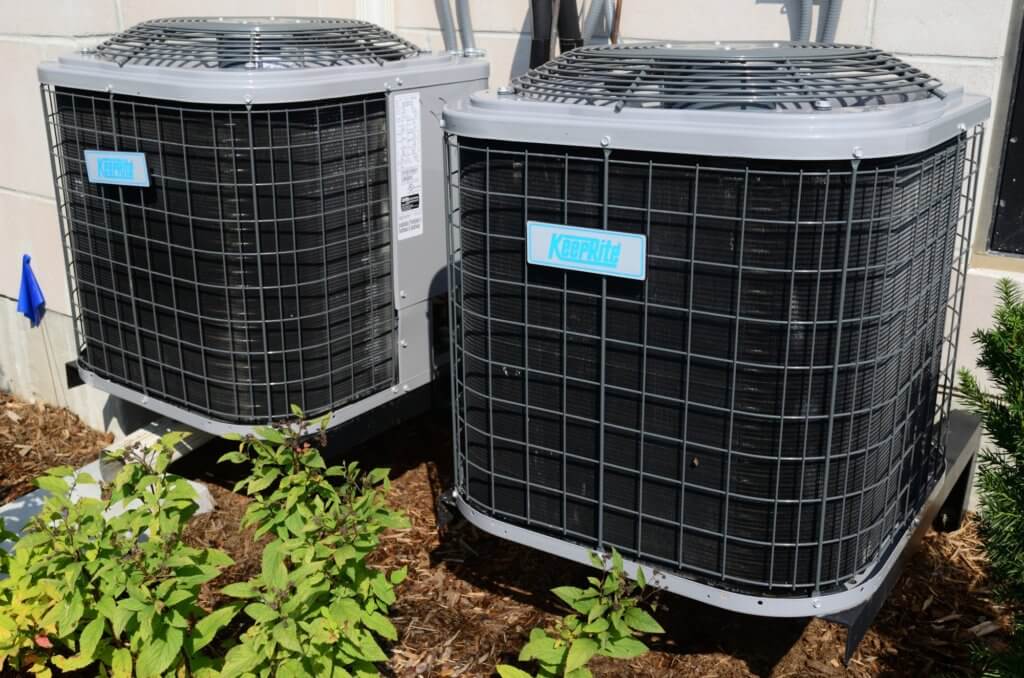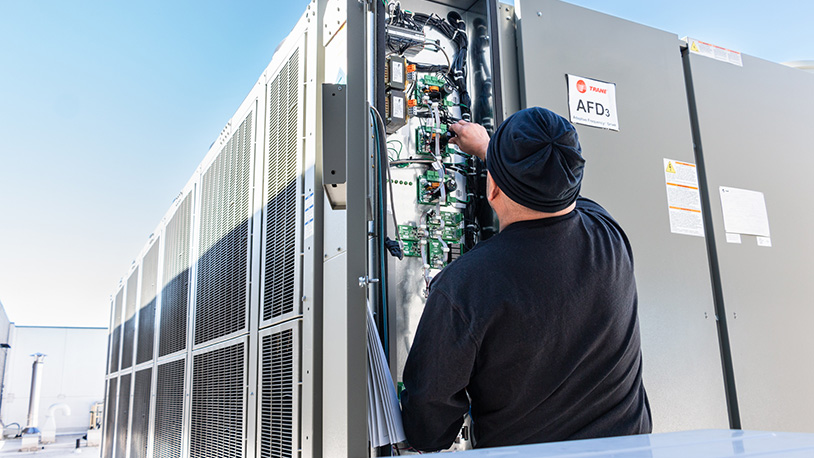Find out how HVAC experts provide budget-friendly indoor air solutions
Wiki Article
Discovering the Necessary Elements of an Efficient A/c System
A reliable cooling and heating system is improved a number of crucial parts that function in consistency. Each component, from the thermostat to the ductwork, plays a necessary duty in maintaining convenience and power performance. Comprehending these aspects is crucial for maximizing performance and boosting interior air high quality. As one examines these parts, the complex connections between them disclose insights into improving overall system efficiency. What certain factors contribute most to this effectiveness?The Function of the Thermostat in Heating And Cooling Efficiency

Commonly overlooked, the thermostat plays an essential function in the efficiency of Cooling and heating systems. This little device serves as the primary nerve center, managing temperature level settings and making certain excellent comfort within a space. By precisely sensing the ambient temperature level, the thermostat communicates with the air, heating, and ventilation conditioning units to preserve the wanted environment
A reliable thermostat decreases power usage by triggering the HVAC system only when necessary, thus avoiding excessive heating or air conditioning. Modern programmable and wise thermostats boost this performance further by enabling users to set schedules and from another location change setups, adapting to everyday routines.
The positioning of the thermostat is important; improper location can lead to unreliable temperature level readings, resulting in ineffective operation. In general, a well-functioning thermostat not just enhances convenience however additionally adds noticeably to power financial savings and the long life of the heating and cooling system.
Comprehending the Relevance of Air Filters
Air filters serve a necessary feature in a/c systems by guaranteeing that the air flowing within an area stays healthy and balanced and tidy. These filters catch dirt, irritants, and other toxins, avoiding them from being recirculated throughout the atmosphere. By capturing these particles, air filters add to improved indoor air top quality, which can greatly profit residents' health, specifically those with allergies or respiratory conditions.Additionally, keeping tidy air filters enhances the effectiveness of HVAC systems. Clogged up filters can restrict air movement, creating the system to function tougher to preserve wanted temperature levels, leading to raised energy usage and higher energy bills. Consistently changing or cleansing filters is a crucial upkeep action that can prolong the life expectancy of heating and cooling devices. Inevitably, recognizing the value of air filters allows home owners and structure managers to take positive steps to assure a well-functioning, effective a/c system that advertises a comfortable and secure interior setting.

The Performance of the Heating System and Heatpump
Furnaces and heatpump are critical elements of a/c systems, in charge of providing warmth during cooler months. Heating systems operate by home heating air through burning or electric resistance, after that distributing it throughout the home through ducts. They typically supply fast heating and can be fueled by gas, electrical power, or oil, relying on the system kind.Conversely, heatpump move heat rather than generate it. They remove heat from the outdoors air or ground, even in reduced temperature levels, and move it inside. HVAC experts. This double capability enables heat pumps to likewise give air conditioning in warmer months, making them functional choices for year-round climate control
Both systems need proper maintenance to ensure performance and durability. While heaters stand out in extreme cool, heat pumps can be advantageous in modest climates. Understanding their distinctive functionalities help homeowners in choosing the most ideal option for their home heating requires.
Discovering the Air Conditioning Unit
The cooling system is a vital component of cooling and heating systems, offered in numerous types to match various requirements. Comprehending the performance scores of these devices is crucial for making educated selections regarding power intake and price. This section will explore the varied types of air conditioning system and make clear exactly how performance rankings influence efficiency.Kinds of Air Conditioners
While various aspects affect the option of cooling systems, recognizing the various kinds readily available is crucial for home owners and structure supervisors alike. Central air conditioners are developed to cool down entire homes or structures, using a network of air ducts for air movement. Home window systems offer a more localized remedy, perfect for check my source solitary rooms or small rooms. Portable air conditioners provide adaptability, allowing customers to relocate the unit as required. Ductless mini-split systems are one more option, combining the performance of central systems with the benefit of zoning, as they need no ductwork. Geothermal systems harness the planet's temperature level for energy-efficient air conditioning. Each kind includes distinct benefits, making informed choices necessary for efficient environment control.
Performance Rankings Described
Recognizing performance scores is vital for choosing the appropriate a/c unit, as these metrics give understanding into the system's efficiency and energy consumption. The most common rating for a/c unit is the Seasonal Energy Performance Proportion (SEER), which determines the cooling outcome throughout a normal air conditioning period split by the total electric energy input. A higher SEER suggests better effectiveness. Additionally, the Energy Effectiveness Proportion (EER) is utilized for gauging efficiency under certain conditions. Another essential metric is the Energy Celebrity certification, which represents that an unit meets strict power efficiency standards. By evaluating these scores, customers can make enlightened options that not just optimize convenience but likewise minimize energy prices and environmental effect.The Importance of Ductwork and Air flow
Effective ductwork design and air flow administration play critical duties in the general effectiveness and efficiency of cooling and heating systems. Correct ductwork warranties that conditioned air is dispersed uniformly throughout an area, lessening temperature fluctuations and boosting convenience. Well-designed ducts decrease resistance to airflow, reducing the workload on a/c tools and inevitably lowering energy usage.Air flow HVAC experts management entails purposefully positioning vents and signs up to boost the circulation of air. This stops usual concerns such as warm or cool places, which can occur when air movement is blocked or improperly balanced. Additionally, the right air duct materials and insulation can further enhance efficiency by lowering warmth loss or gain throughout air transportation.
A reliable ductwork system not only adds to energy savings but can also extend the lifespan of heating and cooling equipment by decreasing unnecessary strain (HVAC experts). Consequently, comprehending the importance of ductwork and airflow is essential for attaining peak cooling and heating system performance
Regular Upkeep Practices to Enhance Performance
Routine upkeep techniques are necessary for ensuring peak performance of cooling and heating systems. These techniques include regular inspections, cleaning, and necessary repairs to keep the system running successfully. Consistently transforming air filters is vital, as stopped up filters can obstruct air flow and decrease performance. On top of that, service technicians should inspect and tidy evaporator and condenser coils to stop overheating and power wastage.Yearly professional inspections are also suggested, as experienced professionals can determine possible issues prior to they rise. Lubricating relocating components reduces damage, contributing to a longer life-span for the system. Moreover, making sure that the thermostat operates properly aids in preserving suitable temperature control.

Frequently Asked Concerns
Just how Commonly Should I Replace My Thermostat?
Thermostats must typically be replaced every 5 to ten years, relying on usage and innovation innovations. Regular checks are suggested to assure peak efficiency, particularly if experiencing inconsistent temperature control or raised energy expenses.What Size Air Filter Is Finest for My Heating And Cooling System?
The very best size air filter for a HVAC system differs by unit design. Generally, it's essential to seek advice from the owner's handbook or check the existing filter dimensions to ensure peak performance and air top quality.Can I Mount a Heat Pump Myself?
Installing a heatpump individually is possible for skilled people, yet it calls for knowledge of electric systems and neighborhood codes. Working with a professional is recommended to assure correct setup and suitable system efficiency.Just how Do I Know if My Ductwork Is Effective?
To identify ductwork efficiency, one must look for leaks, action air movement at vents, check insulation top quality, and review temperature level differences between supply and return ducts. Expert assessments can provide thorough understandings right into total efficiency.What Are Indications My Heating And Cooling Needs Immediate Upkeep?
Signs that a HVAC system requires instant maintenance include unusual noises, irregular temperature levels, raised power expenses, undesirable smells, and regular biking. Addressing these concerns without delay can prevent more damages and assurance peak system performance.Air filters serve a necessary function in HVAC systems by guaranteeing that the air flowing within a space remains tidy and see here now healthy and balanced. Additionally, keeping tidy air filters enhances the efficiency of Heating and cooling systems. Ductless mini-split systems are an additional alternative, integrating the efficiency of central systems with the ease of zoning, as they require no ductwork. Understanding effectiveness scores is essential for picking the right air conditioning system, as these metrics give understanding into the system's performance and power intake. The ideal dimension air filter for an A/c system differs by unit style.
Report this wiki page